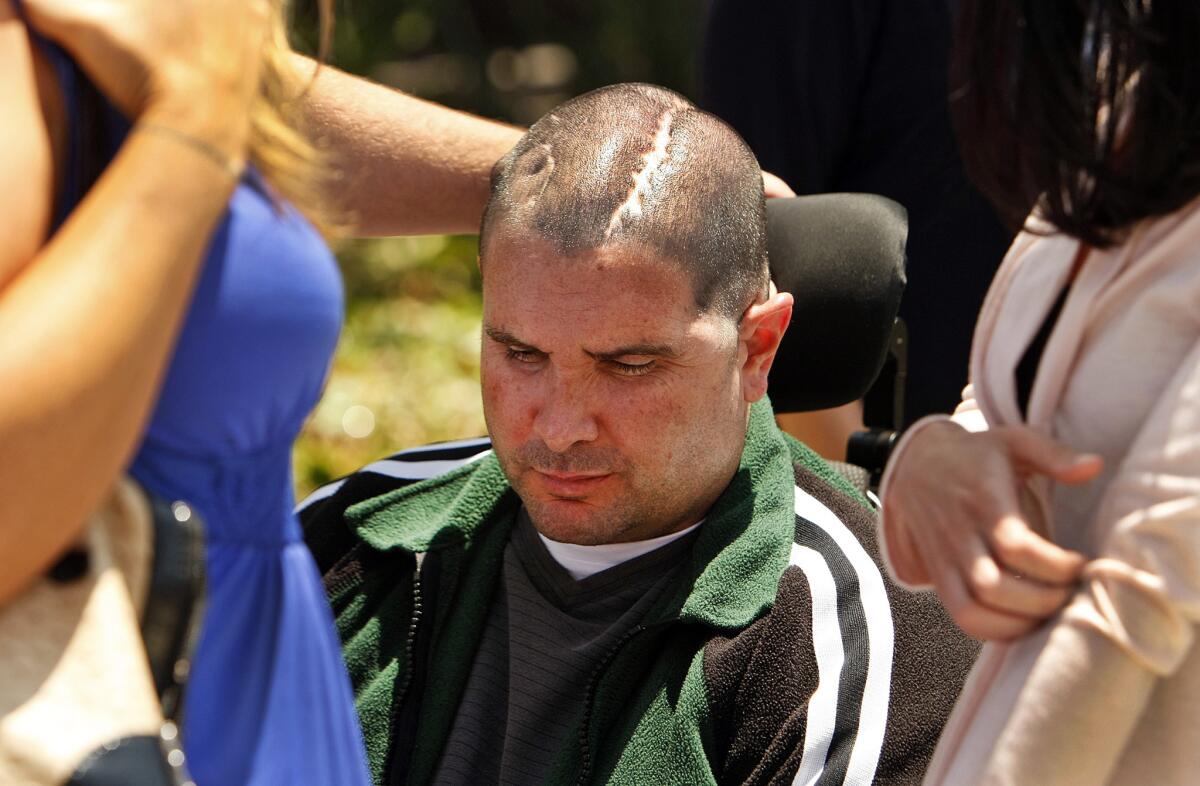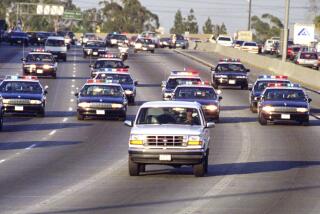911 call played in Bryan Stow civil trial

The punch came hard and fast. The sound was nauseating.
“It was a crack, a sickening crack — fist hitting bone. That’s the only way that I can describe it,” Corey Maciel said Tuesday in a downtown Los Angeles courtroom.
His friend Bryan Stow was felled in an instant.
“I heard his head hit the asphalt — another sickening crack,” Maciel said.
Testifying in the civil trial that accuses the Los Angeles Dodgers and former owner Frank McCourt of negligence in Stow’s attack, Maciel was emotional as he re-created the night of March 31, 2011.
He and Stow had driven along with Alan “Jeff” Bradford and Matthew Lee from the Bay Area and arrived in Los Angeles that afternoon for opening day. All but Lee were paramedics, a profession they would rely on hours later.
After a stop at Maciel’s brother’s barbershop, the group bought beer and drank at their motel. They took a cab to Dodger Stadium, where their San Francisco Giants gear attracted jeers and taunts. Hot dogs and peanuts were thrown at them. At one point, Maciel said, he was intoxicated. Bradford testified last week that Stow was also inebriated.
Afterward, the reception by Dodgers fans in the parking lot was mixed, Maciel said. Some offered handshakes and calls of “good game.” Others shouted profanities.
When two women sneered at them in the parking lot, Maciel said, Stow was fed up and said in a loud voice, “I hope they code” — a reference to cardiac arrest.
Maciel testified that a man later identified as Louie Sanchez then approached and shoved Stow, demanding to know what was just said.
Maciel said he and Stow quickly walked away.
“We figured it was an isolated incident there wasn’t going to be anything further and we kind of relaxed.”
Moments later, Maciel said he saw Sanchez strike Bradford in the face and move on to punch and kick Stow in the head. Sanchez’s friend Marvin Norwood kicked Stow in the torso, Maciel said.
“Did you see any movement from Mr. Stow?” David Lira, one of Stow’s attorneys asked.
“Only his head reacting to the kick,” said Maciel as he grew visibly emotional on the witness stand.
The 29-year-old said he ran toward Stow.
“I threw myself on top of him, over his head, to shield him,” he said. “They were still standing there. … I said, ‘He’s unconscious! What else do you want? Leave him alone!’”
Attorneys played for jurors a 911 call from that evening in which Maciel can be heard relying on his paramedic training to help his friend.
A witness called 911 but handed the phone to Maciel.
“He’s got snoring respirations at the moment, bleeding out of his left ear, no response to painful stimuli — we need an ambulance right now,” Maciel says about Stow in the recording.
“It was a Dodger fan in a Dodger jersey, there’s no way to identify him,” Maciel tells the operator. “If I saw him I would recognize him but he’s gone.” The assailants were later identified as Sanchez and Marvin Norwood, both of whom later pleaded guilty to the attack.
Maciel says he won’t start CPR because Stow is not in arrest.
“His respiratory rate is decreasing. … He was struck by a fist in the head, he hit the ground, also hit his head on the ground. He’s still unconscious.”
At one point Maciel says Stow is “close to Kussmauls,” referring to abnormally slow breathing.
He then says Stow’s cervical spine has been manually immobilized.
“Jesus Christ. Where’s the nearest trauma center?” Maciel asks.
Several times, Maciel says simply, “He’s not good.”
Jurors wiped their eyes as the recording played.
By the end of the eight-minute call, a woman tells the operator that the Fire Department has arrived.
Witnesses have estimated that it took about 15 minutes for security to show up after Stow was hit.
Maciel couldn’t recall exactly how much time passed. “It’s hard to say,” he testified. “It felt like forever.”
More to Read
Start your day right
Sign up for Essential California for news, features and recommendations from the L.A. Times and beyond in your inbox six days a week.
You may occasionally receive promotional content from the Los Angeles Times.







